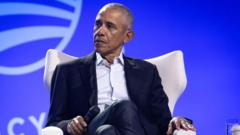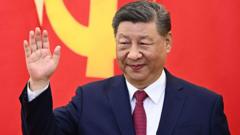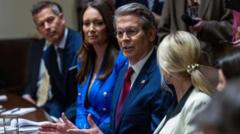Trump’s aggressive trade stance risks alienating allies and limiting scope of negotiations on important global issues.
**Trump Faces Domestic and International Consequences from Trade War with China**

**Trump Faces Domestic and International Consequences from Trade War with China**
A deep dive into how tariffs may jeopardize broader negotiations critical to U.S.-China relations.
In an increasingly polarized geopolitical landscape, President Trump's assertive approach to trade with China has raised concerns across various sectors. While initially, Trump exhibited a willingness to engage with President Xi Jinping on pressing matters—from trade imbalances to technological competition—his recent focus on tariffs has created schisms in potential negotiations relating to Taiwan, fentanyl trafficking, TikTok, and nuclear arms control.
As the trade war escalates, sources within the administration have characterized a divided White House, struggling to develop a coherent strategy for engaging with China. Various factions hold divergent views on the objectives behind the tariffs, ranging from efforts to force concessions from China to a broader agenda of pursuing economic independence from Beijing. This lack of consensus has resulted in further uncertainty over U.S. intentions.
China's response to the tariffs has been robust. Beijing has employed a strategy of matching tariff hikes and demonstrating its resilience in the face of economic pressure. With trade between the two nations amounting to over $640 billion, the stakes are high for both economies, translating into potential ramifications for global commerce.
As Trump's administration ventures into negotiations, there exists the possibility that he may find himself at the table without the support of traditional allies—an outcome that could severely limit the U.S.'s negotiating power. The implications extend beyond tariffs to a complex web of global concerns that require diplomatic finesse, where a unified front against China is essential for effective engagement.
As the situation evolves, it remains to be seen whether Trump can recalibrate his strategy, or if the ongoing trade tensions will overshadow critical discussions necessary for addressing broader concerns in the U.S.-China relationship.
As the trade war escalates, sources within the administration have characterized a divided White House, struggling to develop a coherent strategy for engaging with China. Various factions hold divergent views on the objectives behind the tariffs, ranging from efforts to force concessions from China to a broader agenda of pursuing economic independence from Beijing. This lack of consensus has resulted in further uncertainty over U.S. intentions.
China's response to the tariffs has been robust. Beijing has employed a strategy of matching tariff hikes and demonstrating its resilience in the face of economic pressure. With trade between the two nations amounting to over $640 billion, the stakes are high for both economies, translating into potential ramifications for global commerce.
As Trump's administration ventures into negotiations, there exists the possibility that he may find himself at the table without the support of traditional allies—an outcome that could severely limit the U.S.'s negotiating power. The implications extend beyond tariffs to a complex web of global concerns that require diplomatic finesse, where a unified front against China is essential for effective engagement.
As the situation evolves, it remains to be seen whether Trump can recalibrate his strategy, or if the ongoing trade tensions will overshadow critical discussions necessary for addressing broader concerns in the U.S.-China relationship.





















